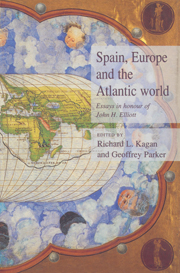Book contents
- Frontmatter
- Contents
- Notes on contributors
- Acknowledgements
- List of abbreviations
- Sir John Elliott: an appreciation
- Introduction
- PART I Power and propaganda: the world of the court
- PART II The pattern of society: community and identity in Habsburg Spain
- PART III Spain and its empire
- 10 David or Goliath? Philip II and his world in the 1580s
- 11 Olivares, the Cardinal-Infante and Spain's strategy in the Low Countries (1635–1643): the road to Rocroi
- 12 Conquest after the conquest: the rise of Spanish domination in America
- 13 Heeding Heraclides: empire and its discontents, 1619–1812
- 14 Why were Spain's special overseas laws never enacted?
- Index
14 - Why were Spain's special overseas laws never enacted?
Published online by Cambridge University Press: 04 August 2010
- Frontmatter
- Contents
- Notes on contributors
- Acknowledgements
- List of abbreviations
- Sir John Elliott: an appreciation
- Introduction
- PART I Power and propaganda: the world of the court
- PART II The pattern of society: community and identity in Habsburg Spain
- PART III Spain and its empire
- 10 David or Goliath? Philip II and his world in the 1580s
- 11 Olivares, the Cardinal-Infante and Spain's strategy in the Low Countries (1635–1643): the road to Rocroi
- 12 Conquest after the conquest: the rise of Spanish domination in America
- 13 Heeding Heraclides: empire and its discontents, 1619–1812
- 14 Why were Spain's special overseas laws never enacted?
- Index
Summary
But, Mr Figaro, today I find that in Havana they have not only not sworn allegiance to the Constitution, but that they are not supposed to swear allegiance to it; that the Government, which I respect so much, has ordered the people not to swear allegiance to it, and that those inhabitants of the island of Cuba who have sworn allegiance to it are rebels; that it seems as if the Constitution is not an overseas matter, much less an absolute good, but rather a relative one. In a word, it is like a hat which sits well only on the head for which it was made, and therefore in the Peninsula alone can it fit.
Mariano José de Larra, Figaro a los redactores de El Mundo, 1836.The Spanish Constitution promulgated on 8 June 1837 included two additional articles of special importance. The first referred to the jury system in the Spanish judicial process, something which still does not exist; the second clearly stated that ‘the overseas provinces will be governed by special laws’, but offered no further particulars. Eight years later, a new constitutional text, written and passed by the moderate Liberals, suppressed the first of the additional articles of the previous constitution but said nothing about the other, concerning how Spain's overseas provinces should be governed. The commitment to endow Cuba, Puerto Rico and the Philippines – the last remnants of Spain's overseas empire – with special laws therefore persisted.
- Type
- Chapter
- Information
- Spain, Europe and the AtlanticEssays in Honour of John H. Elliott, pp. 334 - 349Publisher: Cambridge University PressPrint publication year: 1995
- 4
- Cited by



